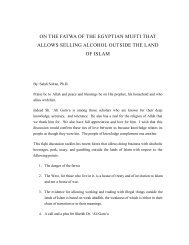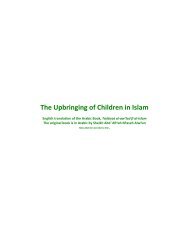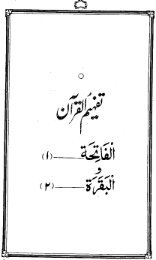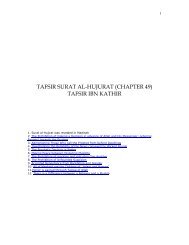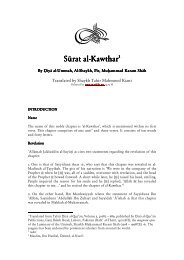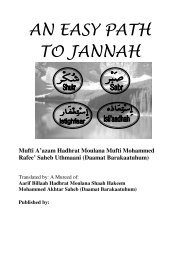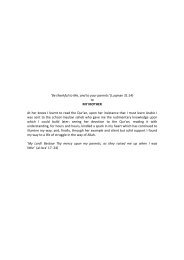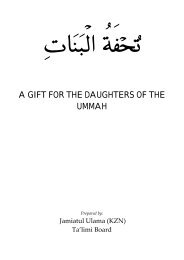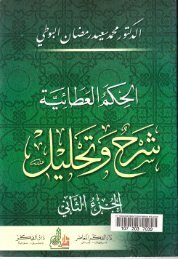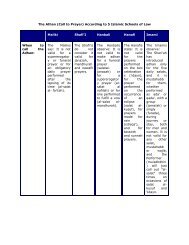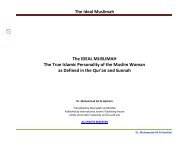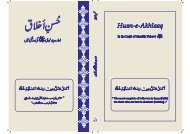Rebellion and Civil Disobedience in Islam The Need for a Paradigm ...
Rebellion and Civil Disobedience in Islam The Need for a Paradigm ...
Rebellion and Civil Disobedience in Islam The Need for a Paradigm ...
Create successful ePaper yourself
Turn your PDF publications into a flip-book with our unique Google optimized e-Paper software.
po<strong>in</strong>t is that if revolution comprises some fitnah, <strong>in</strong>justice <strong>and</strong> oppression are theepitome of fitnah <strong>and</strong> the emblem of sedition.Were the Muslim Scholars Political Quietists?Despite the ‘sixty years of tyranny’ maxim, no one can accuse Muslim scholars,especially the early generations, of be<strong>in</strong>g political quietists. I will dedicate this section tounderst<strong>and</strong> their position which may, <strong>in</strong>correctly, give the impression that they werepropelled by political expediency rather than pr<strong>in</strong>ciple. <strong>The</strong> follow<strong>in</strong>g po<strong>in</strong>ts should betaken <strong>in</strong>to consideration.1) <strong>The</strong> majority of scholars advocated a lenient treatment of rebels that is m<strong>and</strong>atoryon the ruler whether he is just or not. If the jurists were <strong>in</strong> cahoots with the corruptpolitical authorities, they would not establish a discourse of treat<strong>in</strong>g rebels humanely <strong>and</strong>benevolently. To elaborate on this po<strong>in</strong>t, we will discuss al-Shafi`i’s discourse on the lawof rebellion. Al-Shafi`i was not the <strong>in</strong>ventor of this field of jurisprudence, but can beconsidered as the first scholar to engage it <strong>in</strong> a systematic manner. In <strong>Islam</strong>ic law, therebels are referred to as the bughah (literally the transgressors). Many scholars mentionedthat this word does not connotate censure but is rather a technical term derived from theQuranic verse (49:9) 24 . Accord<strong>in</strong>g to al-Shafi`i 25 , the baghi is the one who refuses to obeyal-Imam al-‘adel (the just ruler). He cited the precedents of Abu Bakr <strong>and</strong> Ali 26 <strong>in</strong>support of his arguments. Al-Shafi`i’s imperative to rely heavily on these precedents isthe Quranic (<strong>and</strong> also the Prophetic) praise of the early Companions 27 . A baghi, from al-Shafi`i’s po<strong>in</strong>t of view, must have an <strong>in</strong>terpretation, must commit an overt action ofrebellion, <strong>and</strong> must be a part of a larger group of rebels. If the rebel does not satisfy thethird criterion, he is treated as a crim<strong>in</strong>al as was done to Ibn Muljim, the assass<strong>in</strong> of Ali.<strong>The</strong> rebels are not held liable <strong>for</strong> life <strong>and</strong> property destroyed dur<strong>in</strong>g the course ofrebellion. Be<strong>for</strong>e fight<strong>in</strong>g them, they must first be warned <strong>and</strong> debated. If they mention24 “If two parties among the Believers fall <strong>in</strong>to a quarrel, make peace between them: but if one of themtransgresses beyond bounds aga<strong>in</strong>st the other, then fight aga<strong>in</strong>st the one that transgresses (‘al-lati tabghi)until it complies with the comm<strong>and</strong> of Allah; but if it complies, then make peace between them withjustice, <strong>and</strong> be fair: <strong>for</strong> Allah loves those who are fair (<strong>and</strong> just).”25 From al-Shafi`i’s ‘al-Umm’.26 Abu Bakr when he fought those who refused to pay Zakah <strong>and</strong> Ali when he fought al-Khawarij.27 “<strong>The</strong> vanguard of <strong>Islam</strong>, the first of those who <strong>for</strong>sook their homes <strong>and</strong> of those who gave them aid, <strong>and</strong>also those who follow them <strong>in</strong> all good deeds, well-pleased is Allah with them, as are they with Him: <strong>for</strong>them, He has prepared Gardens under which rivers flow, to dwell there<strong>in</strong> <strong>for</strong>ever: that is the supremeFelicity,” (9:100). Another verse is, “Muhammad is the Messenger of Allah; <strong>and</strong> those who are with himare strong aga<strong>in</strong>st Unbelievers, but compassionate amongst each other. You will see them bow <strong>and</strong>prostrate themselves <strong>in</strong> prayer, seek<strong>in</strong>g grace from Allah <strong>and</strong> His good pleasure. On their faces are theirmarks, be<strong>in</strong>g the traces of their prostration. This is their similitude <strong>in</strong> the Torah; <strong>and</strong> their similitude <strong>in</strong> theGospel is: like a seed which sends <strong>for</strong>th its blade, then makes it strong; it then becomes thick, <strong>and</strong> it st<strong>and</strong>son its own stem, fill<strong>in</strong>g the sowers with wonder <strong>and</strong> delight. As a result, it fills the Unbelievers with rage atthem. Allah has promised those among them who believe <strong>and</strong> do righteous deeds, Forgiveness, <strong>and</strong> a greatReward,” (48:29). And the verse, “Allah's good pleasure was on the Believers when they swore fealty toyou under the Tree: He knew what was <strong>in</strong> their hearts, <strong>and</strong> He sent down tranquility to them; <strong>and</strong> Herewarded them with a speedy victory,” (48:18).13



